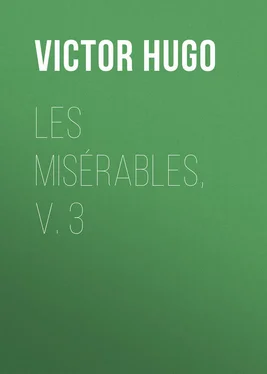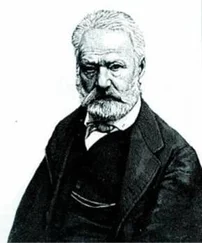Victor Hugo - Les Misérables, v. 3
Здесь есть возможность читать онлайн «Victor Hugo - Les Misérables, v. 3» — ознакомительный отрывок электронной книги совершенно бесплатно, а после прочтения отрывка купить полную версию. В некоторых случаях можно слушать аудио, скачать через торрент в формате fb2 и присутствует краткое содержание. Жанр: literature_19, foreign_antique, foreign_prose, на английском языке. Описание произведения, (предисловие) а так же отзывы посетителей доступны на портале библиотеки ЛибКат.
- Название:Les Misérables, v. 3
- Автор:
- Жанр:
- Год:неизвестен
- ISBN:нет данных
- Рейтинг книги:4 / 5. Голосов: 1
-
Избранное:Добавить в избранное
- Отзывы:
-
Ваша оценка:
- 80
- 1
- 2
- 3
- 4
- 5
Les Misérables, v. 3: краткое содержание, описание и аннотация
Предлагаем к чтению аннотацию, описание, краткое содержание или предисловие (зависит от того, что написал сам автор книги «Les Misérables, v. 3»). Если вы не нашли необходимую информацию о книге — напишите в комментариях, мы постараемся отыскать её.
Les Misérables, v. 3 — читать онлайн ознакомительный отрывок
Ниже представлен текст книги, разбитый по страницам. Система сохранения места последней прочитанной страницы, позволяет с удобством читать онлайн бесплатно книгу «Les Misérables, v. 3», без необходимости каждый раз заново искать на чём Вы остановились. Поставьте закладку, и сможете в любой момент перейти на страницу, на которой закончили чтение.
Интервал:
Закладка:
CHAPTER II
LIKE MASTER, LIKE HOME
He lived in the Marais, at No. 6 Rue des Filles de Calvaire, and the house belonged to him. This house has since been pulled down and rebuilt, and the number has probably been changed in the numbering revolutions which the streets of Paris undergo. He occupied an old and vast suite of rooms on the first floor, furnished up to the ceiling with large Gobelins and Beauvais tapestry, representing shepherd scenes; the subjects of the ceiling and panels were repeated in miniature upon the chairs. He surrounded his bed with an immense screen of Coromandel lacquer-work; long curtains hung from the windows, and made very splendid, large, broken folds. The garden immediately under the windows was reached by a flight of twelve or fifteen steps running from one of them, which the old gentleman went up and down very nimbly. In addition to a library adjoining his bed-room, he had a boudoir, which he was very fond of, a gallant withdrawing-room hung with a magnificent fleur-de-lysed tapestry, made in the galleys of Louis XIV., which M. de Vivonne had ordered of his convicts for his mistress. M. Gillenormand inherited this from a stern maternal great-aunt, who died at the age of one hundred. He had had two wives. His manners were midway between those of the courtier, which he had never been, and of the barrister, which he might have been. He was gay and pleasing when he liked; in his youth he had been one of those men who are always deceived by their wives and never by their mistresses, because they are at once the most disagreeable husbands and the most charming lovers imaginable. He was a connoisseur of pictures, and had in his bed-room a marvellous portrait of somebody unknown, painted by Jordaens with bold strokes of the brush, and with an infinitude of details. M. Gillenormand's coat was not in the style of Louis XV., or even Louis XVI., but it was in the style of the exquisites of the Directory. He had believed himself quite a youth at that time, and followed the fashions. His coat was of light cloth with large cuffs, a long codfish tail, and large steel buttons. Add to these knee-breeches and buckle-shoes. He always had his hands in his fobs, and said authoritatively, "The French Revolution is a collection of ruffians."
CHAPTER III
LUC ESPRIT
At the age of sixteen, when at the opera one night, he had the honor of being examined simultaneously by two beauties, at that time, celebrated and sung by Voltaire, – la Camargo, and la Salle. Caught between two fires, he beat an heroic retreat towards a little dancing – girl of the name of Naheury, sixteen years of age, like himself, obscure as a cat, of whom he was enamoured. He abounded in recollections, and would exclaim, "How pretty that Guimard-Guimardini-Guimardinette was, the last time I saw her at Longchamps, with her hair dressed in 'sustained feelings,' her 'come and see them' of turquoises, her dress of the color of 'newly-arrived people,' and her muff of 'agitation.'" He had worn in his youth a jacket of Nain-Londeur, to which he was fond of alluding: "I was dressed like a Turk of the Levantine Levant." Madame Boufflers, seeing him accidentally when he was twenty years of age, declared him to be "a charming madcap." He was scandalized at all the names he saw in politics and power, and considered them low and bourgeois. He read the journals, the newspapers, the gazettes , as he called them, and burst into a laugh. "Oh!" he would say, "who are these people? Corbière! Humann! Casimir Périer! There's a ministry for you! I can imagine this in a paper, – M. Gillenormand, Minister; it would be a farce, but they are so stupid that it might easily happen." He lightly called everything by its proper or improper name, and was not checked by the presence of ladies; and he uttered coarseness, obscenity, and filth with a peculiarly calm and slightly amazed accent in which was elegance. Such was the loose manner of the age. It is to be remarked that the season of circumlocution in verse was that of crudities in prose. His grandfather had predicted that he would be a man of genius, and gave him the two significant Christian names, Luc Esprit.
CHAPTER IV
AN ASPIRING CENTENARIAN
He gained prizes in his youth at the college of Moulins, in which town he was born, and was crowned by the hand of the Due de Nivernais, whom he called the Due de Nevers. Neither the Convention, the death of Louis XVI., Napoleon, nor the return of the Bourbons, had effaced the recollection of this coronation. The Due de Nevers was to him the grand figure of the age. "What a charming nobleman!" he would say, "and how well his blue ribbon became him!" In the eyes of M. Gillenormand, Catherine II. repaired the crime of the division of Poland by purchasing of Bestucheff, for three thousand roubles, the secret of the elixir of gold, and on this point he would grow animated. "The elixir of gold!" he would exclaim. "Bestucheff's yellow tincture and the drops of General Lamotte were, in the 18th century, at one louis the half-ounce bottle, the grand remedy for love catastrophes, the panacea against Venus. Louis XV. sent two hundred bottles of it to the Pope." He would have been greatly exasperated had he been told that the gold elixir is nothing but perchloride of iron. M. Gillenormand adored the Bourbons, and held 1789 in horror; he incessantly described in what way he had escaped during the Reign of Terror, and how he had been obliged to display great gayety and wit in order not to have his head cut off. If any young man dared in his presence to praise the Republic, he turned blue, and grew so angry as almost to faint. Sometimes he alluded to his ninety years, and said, "I trust that I shall not see ninety-three twice." At other times, he informed persons that he intended to live to be a hundred.
CHAPTER V
BASQUE AND NICOLETTE
He had his theories; here is one of them: "When a man passionately loves women, and himself has a wife for whom he cares little, – a wife that is ugly, legitimate, full of her rights, reliant on the Code, and jealous when she likes to be so, he has only one way of getting out of the hobble and living at peace; it is to leave his purse – strings to his wife. This abdication renders him free; the wife is henceforth occupied, grows passionately fond of handling specie, verdigrises her fingers, undertakes to instruct the peasants and train the farmers, harangues the notaries, visits their offices, follows the course of lawsuits, draws up leases, dictates contracts, knows she is absolute, sells, buys, regulates, orders, promises and compromises, yields, concedes and recedes, arranges, deranges, saves, and squanders; she commits follies, and this affords her supreme personal pleasure and consolation. While her husband disregards her she has the satisfaction of ruining her husband." This theory M. Gillenormand applied to himself, and it became his history. His wife, the second one, managed his fortune in such a manner that one fine day when he found himself a widower, he had just enough to live on, by buying an annuity, three fourths of which would expire with him. He had not hesitated, for he did not care much about leaving anything to his heir, and, besides, he had seen that patrimonies had their adventures, and, for instance, became "National Property;" he had seen the avatars of the three per cent consols, and put but little faith in the great Book. "All that is Rue Quincampoix!" he would say. His house in the Rue des Filles du Calvaire belonged, as we stated, to him, and he had, two servants, "a he and a she." When a servant came into his house M. Gillenormand rechristened him, and gave the men the name of their province, Nîmois, Comtois, Poitevin, or Picard. His last valet was a fat cunning man of fifty-five, incapable of running twenty yards; but as he was born at Bayonne, M. Gillenormand called him Basque. As for the maid-servants, he called them all Nicolette (even la Magnon, to whom we shall allude directly). One day a bold cook, a Cordon Bleu, of the proud concierge race, presented herself "What wages do you expect a month?" M. Gillenormand asked her. "Thirty francs." "What is your name?" "Olympie." "I will give you forty, and call you Nicolette."
Читать дальшеИнтервал:
Закладка:
Похожие книги на «Les Misérables, v. 3»
Представляем Вашему вниманию похожие книги на «Les Misérables, v. 3» списком для выбора. Мы отобрали схожую по названию и смыслу литературу в надежде предоставить читателям больше вариантов отыскать новые, интересные, ещё непрочитанные произведения.
Обсуждение, отзывы о книге «Les Misérables, v. 3» и просто собственные мнения читателей. Оставьте ваши комментарии, напишите, что Вы думаете о произведении, его смысле или главных героях. Укажите что конкретно понравилось, а что нет, и почему Вы так считаете.












